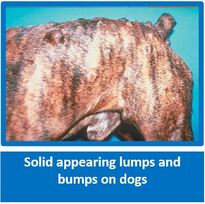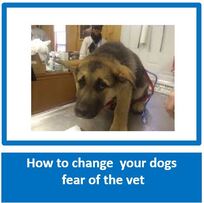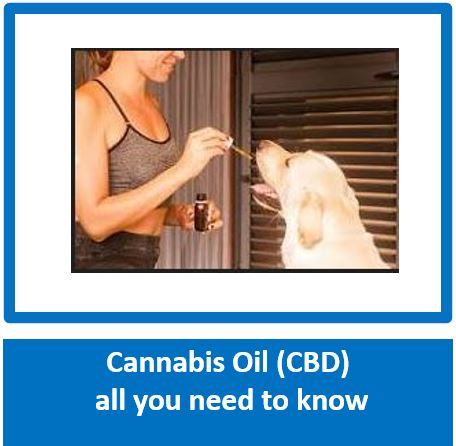|
Genric Pet Insurance helps you to pay for any unexpected costs, and if your pet becomes Ill or has an accident, your first thoughts will be about their care, and not about unexpected costs. Prevention of illness is very important, so do speak to your vet about recommending a top quality food, as well as all required for pest protection. www.genricpet.co.za for more info, and don't hesitate to contact us for assistance.
|
Poor Nutrition In Dogs
www.wagwalking.com - a really great site with plenty of good articles - do visit and enjoy!
www.wagwalking.com - a really great site with plenty of good articles - do visit and enjoy!

What is Poor Nutrition?
Poor nutrition can lead to many serious disorders in dogs, including obesity, emaciation, rickets, increased allergies, and hair loss. These disorders are frequently caused by either the amount or quality of the food that is offered but can also be triggered by some medical disorders and infestations of parasites. If your dog is showing signs of malnutrition, the animal’s gastrointestinal health and daily diet should be evaluated by a veterinary professional in order to craft an appropriate treatment plan. Proper nutrition is an essential component of canine health and should be carefully evaluated and managed throughout your canine companion’s life.
Symptoms of Poor Nutrition in Dogs
There are several things that can indicate that your pet is receiving inadequate nutrition in one way or another. Some of the signs that their diet or digestion needs to be re-evaluated can include:
Types
There are several diseases and conditions that can be impacted by nutritional imbalances. A few of the more common diseases can include:
Causes of Poor Nutrition in Dogs
Diagnosis of Poor Nutrition in Dogs
Diagnostics for a dog that is experiencing the symptoms of poor nutrition will start with a physical examination including standard tests such as a urinalysis, a biochemical profile, and a complete blood count. This examination will help the veterinarian handling your case to determine if the animal is over or under weight as well as revealing the health of the liver and kidneys. A fecal float may be employed to uncover the presence of any parasites that are residing in the system and skin samples may be examined microscopically if the skin has been affected by the malnutrition.
Once any underlying disorders or diseases have been treated or ruled out, the patient’s daily diet and activity levels will be explored. Your veterinarian will evaluate the caloric intake, the nutritional balance of the food being offered, the activity level of the animal, and the timeline of the onset of the symptoms of poor nutrition in order to develop a treatment plan specific to your dog.
Treatment of Poor Nutrition in Dogs
Dogs that are in crisis when they come into the veterinary office will be given supportive treatments, including intravenous fluids to prevent hydration and to correct imbalances. Beyond that, the treatment for a canine that is getting inappropriate nutrition will depend on the underlying cause of the deficiency. Dogs that are afflicted with parasites will be given dewormers to restore their digestive functionality, tumors or polyps in the digestive tract will be removed, and diseases like inflammatory bowel disease and bacterial overgrowth will be addressed as well.
Once all medical issues have been addressed, the information from the evaluation of the patient’s daily diet and exercise levels will be utilized to uncover if the food the dog is being offered is of poor quality or if it is inappropriate for your dog’s breed, overall health, or stage of life. In the majority of cases, changes to the dog’s diet will be recommended; changes can include steps such as changing the animal’s usual food, increasing or decreasing their activity levels, and occasionally even adding in supplemental vitamins and minerals to overcome any deficiencies that cannot be addressed by a simple change of food.
Recovery of Poor Nutrition in Dogs
If caught early, many nutrition related illnesses can be reversed, however, there are some exceptions. Some diseases, such as diabetes, kidney diseases, and chronic pancreatitis, may require lifelong medications and treatments, and nutritional deficiencies that occur during the formative periods may cause permanent disfigurement or disability.
Nutritional deficiencies that are unaddressed frequently lead to serious disability and even death, so signs that your dog is not receiving an adequate balance of nutrients should be taken seriously, and a veterinary professional should be consulted as soon as possible. Your dog’s daily diet and exercise habits should be re-evaluated on a regular basis to take into consideration the animal’s activity levels, overall condition, and their age.
Poor nutrition can lead to many serious disorders in dogs, including obesity, emaciation, rickets, increased allergies, and hair loss. These disorders are frequently caused by either the amount or quality of the food that is offered but can also be triggered by some medical disorders and infestations of parasites. If your dog is showing signs of malnutrition, the animal’s gastrointestinal health and daily diet should be evaluated by a veterinary professional in order to craft an appropriate treatment plan. Proper nutrition is an essential component of canine health and should be carefully evaluated and managed throughout your canine companion’s life.
Symptoms of Poor Nutrition in Dogs
There are several things that can indicate that your pet is receiving inadequate nutrition in one way or another. Some of the signs that their diet or digestion needs to be re-evaluated can include:
- Bad breath
- Body odor
- Dandruff
- Dull coat
- Excessive shedding
- Flatulence
- Hair loss
- Inconsistent or unusual bowel movements
- Increased allergies
- Obesity
- Skin disorders
- Weight loss
Types
There are several diseases and conditions that can be impacted by nutritional imbalances. A few of the more common diseases can include:
- Congestive heart failure - Excessive salt in the diet can severely increase your dog’s chances of developing or exacerbating congestive heart failure Growth disorders - Dogs who receive too much or too little calcium during their formative stages may develop abnormal rates of bone growth
- Kidney disease - Kidney disease can be caused by a number of nutritional imbalances, including excessive amounts of sodium, potassium, or phosphorus and deficient hydration
- Obesity - Obesity can be caused by either eating too much overall or by eating food that is improperly balanced for your dog’s circumstances
- Pancreatitis - This condition characterized by an inflamed pancreas is often triggered by excessive fats in the diet
Causes of Poor Nutrition in Dogs
- Medical disorders - Certain disorders and diseases, such as bacterial overgrowth, intestinal tumors, or inflammatory bowel disease, can render even the best diet inadequate by preventing the absorption of the nutrients
- Overfeeding - Poor nutrition can be attributed not just to a lack of proper nutrients, but also an overabundance and it is common knowledge that consuming more overall calories can lead to obesity; however, the overabundance of specific nutrients such as vitamin A or phosphorus can cause dangerous imbalances as well
- Parasites - The best known of the parasites to cause malnutrition is the tapeworm, although other parasites such as roundworms or Giardia may also interfere with the absorption of nutrients.
- Poor food quality - If the food that you are feeding your canine companion is deficient in certain nutrients, such as vitamin D, calcium, or even proteins, it can cause serious disorders which frequently have irreversible consequences
- Under feeding - Dogs that are not given enough food will lose weight, typically become weakened and susceptible to diseases and allergies, and may become lethargic; if the caloric deficiency is not addressed, it may lead to death by starvation
Diagnosis of Poor Nutrition in Dogs
Diagnostics for a dog that is experiencing the symptoms of poor nutrition will start with a physical examination including standard tests such as a urinalysis, a biochemical profile, and a complete blood count. This examination will help the veterinarian handling your case to determine if the animal is over or under weight as well as revealing the health of the liver and kidneys. A fecal float may be employed to uncover the presence of any parasites that are residing in the system and skin samples may be examined microscopically if the skin has been affected by the malnutrition.
Once any underlying disorders or diseases have been treated or ruled out, the patient’s daily diet and activity levels will be explored. Your veterinarian will evaluate the caloric intake, the nutritional balance of the food being offered, the activity level of the animal, and the timeline of the onset of the symptoms of poor nutrition in order to develop a treatment plan specific to your dog.
Treatment of Poor Nutrition in Dogs
Dogs that are in crisis when they come into the veterinary office will be given supportive treatments, including intravenous fluids to prevent hydration and to correct imbalances. Beyond that, the treatment for a canine that is getting inappropriate nutrition will depend on the underlying cause of the deficiency. Dogs that are afflicted with parasites will be given dewormers to restore their digestive functionality, tumors or polyps in the digestive tract will be removed, and diseases like inflammatory bowel disease and bacterial overgrowth will be addressed as well.
Once all medical issues have been addressed, the information from the evaluation of the patient’s daily diet and exercise levels will be utilized to uncover if the food the dog is being offered is of poor quality or if it is inappropriate for your dog’s breed, overall health, or stage of life. In the majority of cases, changes to the dog’s diet will be recommended; changes can include steps such as changing the animal’s usual food, increasing or decreasing their activity levels, and occasionally even adding in supplemental vitamins and minerals to overcome any deficiencies that cannot be addressed by a simple change of food.
Recovery of Poor Nutrition in Dogs
If caught early, many nutrition related illnesses can be reversed, however, there are some exceptions. Some diseases, such as diabetes, kidney diseases, and chronic pancreatitis, may require lifelong medications and treatments, and nutritional deficiencies that occur during the formative periods may cause permanent disfigurement or disability.
Nutritional deficiencies that are unaddressed frequently lead to serious disability and even death, so signs that your dog is not receiving an adequate balance of nutrients should be taken seriously, and a veterinary professional should be consulted as soon as possible. Your dog’s daily diet and exercise habits should be re-evaluated on a regular basis to take into consideration the animal’s activity levels, overall condition, and their age.





